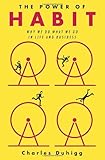https://charlesduhigg.com/the-power-of-habit/
https://www.amazon.com/Power-Habit-What-Life-Business/dp/140...
E.g. teeth-brushing habit: trigger - wake up, action - brush teeth, reward - freshness mint (or other) taste in your mouth. That's basically why a taste was added at all to a toothpaste -- to create a habit loop. Before that teeth-brushing powder/paste was tasteless and resulted in bad sales.
The same habit loop structure is used a lot to change bad habits or to integrate new habits in sports, military, etc. There is a very good book about it by Charles Duhigg:
"The Power of Habit: Why We Do What We Do in Life and Business"
https://www.amazon.com/Power-Habit-What-Life-Business/dp/081...
Systematic, definitely. Scientific? Not really sure, but I find it extremely effective. If I could boil it down to "what works" for me, it'd be:
- Pick a task or thing that you want to accomplish. Let's say running (mine is running/lifting).
- Pick a "cue," or something that signals when you perform said task. The more apparent the cue the better. Mine is waking up. Working out is the first thing I do.
- Follow this routine religiously for about 21 days. That's the magic number according to people who are into this kind of thing, and I agree. At this point you kind of forget what your old habit was when you woke up, and you naturally go to perform your new task.
And lastly, there will be some days when you don't want to perform the task. Do it anyway. A streak of not performing that task is really just the (re)formation of a bad habit.
Having said that, you still have to make choices and stick to them. For this, you need to look at the science of habit change, which a good book is The Power of Habit [2]
[1] http://www.amazon.com/First-Things-Understand-Often-Arent/dp...
[2] http://www.amazon.com/The-Power-Habit-What-Business/dp/08129...
http://www.amazon.com/Breaking-The-Habit-Being-Yourself/dp/1...
http://www.amazon.com/The-Power-Habit-What-Business/dp/14000...
http://www.amazon.com/The-Willpower-Instinct-Self-Control-Ma...
http://www.amazon.com/Switch-Change-Things-When-Hard/dp/0385...
http://www.amazon.com/Drive-Surprising-Truth-About-Motivates...
1: http://www.amazon.com/The-Power-Habit-What-Business/dp/14000...
How to Stop Worrying and Start Living - http://www.amazon.com/How-Stop-Worrying-Start-Living/dp/0671...
How to Win Friends & Influence People - http://www.amazon.com/How-Win-Friends-Influence-People/dp/06...
Also, watch this video.
http://www.youtube.com/watch?v=cIuahuKtim4
And here's the book:
http://www.amazon.com/The-Power-Habit-What-Business/dp/14000...
http://www.amazon.com/The-Power-Habit-Business-ebook/dp/B005...
(Duhigg is a NYT writer and that piece about how Target knew that a girl was pregnant before her father did was an excerpt from this book)
When I saw the HN headline I thought it might be referring to Febreze, a product that Duhigg devotes a chapter to. The sales strategy wasn't about convincing people that they stunk, but pitching Febreze as a product that you used after you cleaned a room, to associate it with the "reward" of a clean room.
Duhigg's book also touches on how Pepsodent became a breakthrough product partly because an ad-man convinced Americans they needed to battle the film that naturally covers their teeth.
You may find evidence to support this (and other information about habits) in The Power of Habit by Charles Duhigg. http://www.amazon.com/The-Power-Habit-What-Business/dp/14000...
From personal experience, I've found the Seinfeld Calendar to be powerful, which is similar to the idea the author wrote about. http://lifehacker.com/281626/jerry-seinfelds-productivity-se...
The jist of it is that we all have habit loops that we respond to without realizing it. They flow through the cycle of CUE->ROUTINE->REWARD->CRAVE. Everything starts with a CUE, which triggers the habit. It could be something as simple as the little red indicator on your iphone app. This is followed by ROUTINE - or the series of actions that we normally think of as a habit. Next is the REWARD which can be surprising at times - you might think you get that cookie after lunch to enjoy the sugar rush, but in reality you might just enjoy talking to coworkers in the cafeteria. Lastly, for any habit to stick, you must CRAVE the reward at the end.
The book goes in more depth about how to use this cycle to structure habits in your own life (I have FINALLY started to workout and wake up early since reading the book). It also has great case studies about how advertisers, product managers, people managers, and more are structure these habits to influence consumers, employees, etc

The central theme of that book is that people attribute dumb behaviors to things like chemical dependence, when in fact it's a behavioral habit. The classic example from the book is people trying to quit smoking. You kick the physical dependency in a few days - the headaches and irritability go away, but smokers still relapse months or years afterwards. Why? It's because the smoking formed a habit to their brain, and their brain associated good feelings with smoking.
Read the book. But if you don't: Your brain has trained you to feel good when you read the news. You break this habit by replacing the good feeling of reading the news with a good feeling from some other, positive, healthy activity. Example: every time you get a desire to pull out your phone, do 10 pushups instead. You get a little physical exercise, and your brain starts associating positive feelings with positive activities.
Also, why the hell do you have notifications turned on if you're worried about the phone or the news being addictive? It's like asking to have cravings amplified. Turn off badges, notifications, etc. Check it on your own time and terms.